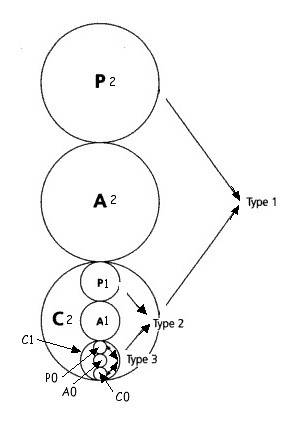This person has a disturbance in their basic character or sense of self. They feel wrong, bad, not right, empty or simply Not OK in their basic sense of self. As mentioned before this is only a small group of people, say around 5%. These people will report that this sense of badness is in their very bones or the cells of their body. The feeling has a somatic quality about it. They will also report that they have always felt like this, that there was never a time where they felt OK about self. In Transactional Analysis theory they feel this badness in their C1 or C0 part of the personality. Thus one can say that this persons sense of badness is experienced as ego syntonic.

Most others do not have this basic sense of badness about self. They feel a sense of basic OKness in self. Later in their development they may suffer various trauma. These can lead to painful feelings like depression and anxiety but these are not experienced as being part of their character or who they are. In this sense they are felt as ego dystonic.
One way to diagnose this is with a relatively easy therapeutic technique. A two chair situation is set up with the client in one chair as the Adult and Parent ego states and they are asked to see the young Child part of self out there in front of them. Most do this relatively easily and will see that small child part of self there.
The client is then asked what is their reaction to the Child? What do they think and feel about the Child part? The vast majority of people will have some kind of positive reaction to the Child. It will be sympathetic in some way and be wanting to help or assist the Child part.

There is a small group where one does not get this reaction. The person will state that there is nothing good or positive about the child and they may indeed state that the child is worthless, disgusting, just full of needs and so forth. The therapist will then hunt around a bit for any positive responses but none are found. This indicates a character problem where the person has a basic sense of dislike or worthlessness. It is this type of person who is most often diagnosed with a personality disorder. It should be noted that a person with a personality disorder may not have such a third degree impasse or character problem but if someone does then a diagnosis of personality disorder should be strongly considered.
Harriet has provided a possible example of the sort of comments one would get in such a two chair exercise as described above. She states:
" I was telling my therapist a couple of months ago that if I ran into myself as a child I would throw her under a bus. I don't like her at all. She was weird, embarrassing, had no social skills, not good at making friends, etc. "
The therapist would need to make further enquires to make sure this was the dominant attitude of the person to the Child part of their personality. If one did not find contrary attitudes of liking or sympathy for the Child then it would be tending to signifiy a third degree impasse.
Graffiti
Uh oh. Really? This is not good. I was telling my therapist a couple of months ago that if I ran into myself as a child I would throw her under a bus. I don't like her at all. She was weird, embarrassing, had no social skills, not good at making friends, etc. I guess there is something wrong with my character. Maybe I'm worse off than I thought and that is why I am not getting better in therapy?
ReplyDeleteHello Harriet,
ReplyDeleteAs you can see I have added part of your comment to the post. If you do not wish it to be there let me know and I will remove it
thanks
Tony
It can stay. I guess I'm a perfect example of someone who is screwed up beyond repair.
ReplyDeleteWell I don't think that Harriet
ReplyDeleteI wish you the best but I know that sometimes it is like you don't even want people to say things like that to you
Tony
If I could sit my child in a chair and look at her...
ReplyDeleteSee.. I couldn't do that... I'm here. Now.
I could do two chair with my parents, siblings... even you, but I can't do that with myself cause I'm here... how could I be there?
Yes you can Roses!
ReplyDeleteVery occasionally you get someone who has great trouble with two chair, but the vast majority of people master it easily in a short space of time. Once it is done a couple of times then they can easily do it.
Some will report embarrassment at talking to an empty chair but again after it has been done once or twice they express no difficulty with the process.
Graffiti
This is interesting stuff but kind of confusing too. Are you saying that if a person has felt flawed for as long as he can remember and reports nothing positive about the child in the two chair situation, then the person has a personality disorder? Can we expect 5% of the world to have personality disorders or, is it that 5% of people who go looking for help get personality disorders confirmed?
ReplyDeleteI find two chair easy as I do have a good imagination.
ReplyDeleteGranted, it is friday night ;-)
but my child looks pretty cute sat opposite me!
xx
That is good news Kahless about how your child looks. Also nothing beats a good imagination.
ReplyDeleteGood toi hear from you
Tony
Hello KYLady,
ReplyDeleteIn answer to your first question, by and large I am saying that. However I would not like to rule out the possibility of a person meeting the criteria of a personality disorder and not having a characteroloical problem.
Your second question is a good one which I am not too sure of the answer. I don't know enough about the research on which such figures are based. Having said that it seems reasonable to conclude that those who meet the criteria of a personality disorder are a very small section of the general community.
Hope you are well
Tony
Well, I have a pretty good imagination and I can't seem to do it.
ReplyDeleteI had a blood test today Tony. It was ok considering its the very worst thing that could happen to anyone.
The ladies were lovely - I guess it helps. Well, it most definatly helps.
About my child... i like her a lot. I like my parent a lot too. Is that what you mean?
Some struggle with seeing their Child in the chair because they are shut of from that part of the personality. I hope you listen to her Roses as you have these medical investigations
ReplyDeleteTony
What part of the personality can see his child in the chair? I thought that was imagination at work. Could there be a predictable measurement of imagination in each personality type? I bet somebody has done a study on that!
ReplyDelete